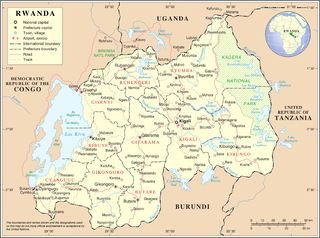Related Research Articles

The International Criminal Tribunal for the former Yugoslavia (ICTY) was a body of the United Nations that was established to prosecute the war crimes that had been committed during the Yugoslav Wars and to try their perpetrators. The tribunal was an ad hoc court located in The Hague, Netherlands.

The International Criminal Tribunal for Rwanda was an international court established in November 1994 by the United Nations Security Council in Resolution 955 in order to judge people responsible for the Rwandan genocide and other serious violations of international law in Rwanda, or by Rwandan citizens in nearby states, between 1 January and 31 December 1994. The court eventually convicted 61 individuals at a cost of $1.3 billion.

Justice Inés Mónica Weinberg de Roca is an Argentine Judge of the Supreme Court of city of Buenos Aires and a Judge of the United Nations Appeals Tribunal in New York City. She was born in Buenos Aires, Argentina on December 16, 1948.
Jean-Paul Akayesu is a former teacher, school inspector, and Republican Democratic Movement (MDR) politician from Rwanda, convicted of genocide for his role in inciting the Rwandan genocide.

Theodor Meron, is an Israeli-American judge. He served as a judge of the International Criminal Tribunal for the former Yugoslavia (ICTY), International Criminal Tribunal for Rwanda (ICTR), and the International Residual Mechanism for Criminal Tribunals (Mechanism). He served as President of the ICTY four times and inaugural President of the Mechanism for three terms (2012–19).
Khalida Rashid Khan is a Pakistani judge who became the first female judge in the Superior Judiciary of Pakistan. She also served as the president of the International Criminal Tribunal for Rwanda.

Fausto Pocar is an Italian jurist. He is professor emeritus of International Law at the University of Milan, where he also taught Private International Law and European Law, and where he served many years as Faculty Dean and Vice-Rector. From 1984-2000, he was an elected member of the Human Rights Committee of the United Nations, serving as the committee's chair from 1991-92.

Hassan Bubacar Jallow is a Gambian judge who has served as Chief Justice of the Gambia since February 2017. He was the Prosecutor of the International Criminal Tribunal for Rwanda (ICTR) from 2003 to 2016, and Prosecutor of the Mechanism for International Criminal Tribunals (MICT) from 2012 to 2016, both at the rank of United Nations Under Secretary-General. He served as Minister of Justice and Attorney General from 1984 to 1994 under President Dawda Jawara.

Charles Ayodeji Adeogun-Phillips is a former United Nations genocide and war crimes prosecutor, international lawyer and founder of Charles Anthony (Lawyers) LLP.

United Nations Security Council resolution 955, adopted on 8 November 1994, after recalling all resolutions on Rwanda, the Council noted that serious violations of international humanitarian law had taken place in the country and, acting under Chapter VII of the United Nations Charter, established the International Criminal Tribunal for Rwanda (ICTR).

United Nations Security Council Resolution 989, adopted unanimously on 24 April 1995, after recalling Resolution 955 (1994), the council listed the nominations for judges at the International Criminal Tribunal for Rwanda.

United Nations Security Council resolution 1200, adopted unanimously on 30 September 1998, after recalling resolutions 955 (1994), 989 (1995) and 1165 (1998), the Council forwarded 18 nominations for judges at the International Criminal Tribunal for Rwanda (ICTR) to the General Assembly for consideration.

United Nations Security Council Resolution 1932, adopted unanimously on June 29, 2010, after recalling resolutions 955 (1995), 1165 (1998), 1329 (2000), 1411 (2002), 1431 (2002), 1717 (2006), 1824 (2008), 1855 (2008), 1878 (2008) and 1901 (2009) on Rwanda, the Council noted that the 2010 target for the completion of trials at the International Criminal Tribunal for Rwanda (ICTR) could not be met, and therefore extended the terms of 16 judges at the ICTR.

United Nations Security Council resolution 1449, adopted unanimously on 13 December 2002, after recalling resolutions 955 (1994), 1165 (1998), 1329 (2000), 1411 (2002) and 1431 (2002), the Council forwarded a list of nominees for permanent judges at the International Criminal Tribunal for Rwanda (ICTR) to the General Assembly for consideration.

The International Residual Mechanism for Criminal Tribunals, also referred to as the IRMCT or the Mechanism, is an international court established by the United Nations Security Council in 2010 to perform the remaining functions of the International Criminal Tribunal for the former Yugoslavia (ICTY) and the International Criminal Tribunal for Rwanda (ICTR) following the completion of those tribunals' respective mandates.

United Nations Security Council Resolution 1684, adopted unanimously on June 13, 2006, after recalling resolutions 955 (1994), 1165 (1998), 1329 (2000), 1411 (2002), 1431 (2002), 1449 (2002), 1503 (2003) and 1534 (2004) concerning the International Criminal Tribunal for Rwanda (ICTR), the Council extended the terms of 11 judges beyond their expiry dates in order for them to complete the trials in which they were sitting.
United Nations Security Council Resolution 1995, adopted unanimously on July 6, 2011, after recalling resolutions 955 (1995), 1503 (2003) and 1534 (2003) on the International Criminal Tribunal for Rwanda (ICTR), the Council permitted temporary judges at the tribunal to vote or stand as candidates in elections to the presidency of the ICTR.
Peter Robinson is an American lawyer who has defended political and military leaders at the United Nations International Criminal Tribunals. His clients include Bosnian Serb President Radovan Karadžić, Rwandan National Assembly President Joseph Nzirorera, Yugoslav Army Chief of Staff Dragoljub Ojdanic, and the lawyer for Liberian President Charles Taylor.
Joseph Asoka Nihal De Silva was the 42nd Chief Justice of Sri Lanka.
Prisca Matimba Nyambe, SC is a Zambian judge who also sits on international tribunals. She is known for dissenting from the majority decisions of the International Criminal Tribunal for the former Yugoslavia (ICTY) judgements which convicted Ratko Mladić and Zdravko Tolimir of war crimes.
References
- 1 2 "Judge William H. Sekule". United Nations International Residual Mechanism for Criminal Tribunals. 2017-01-31. Retrieved 2018-11-28.